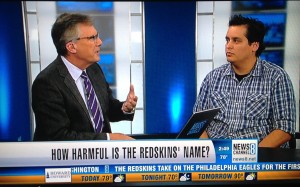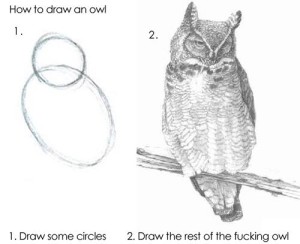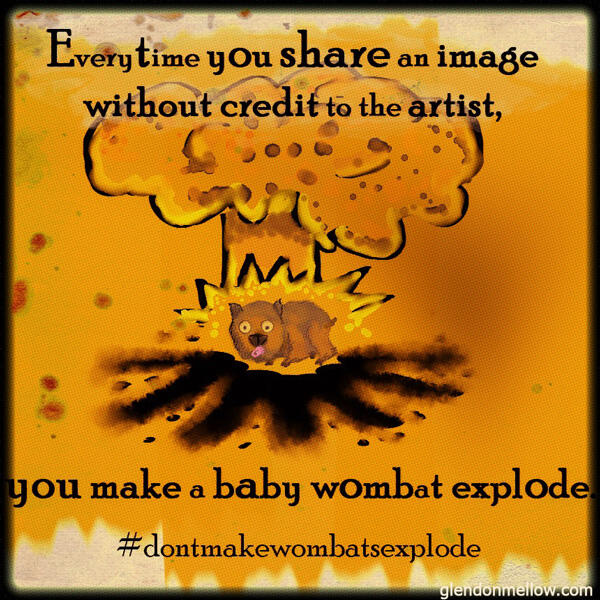On Monday (9/9/13) DC-area artist Gregg Deal appeared on WJLA’s News Channel 8 “Afternoon Report.” Deal went on the show believing he’d been invited into the program to talk about his performance art piece, The Last American Indian on Earth.
Disclaimer: I backed this project during the last Indiegogo campaign and plan to support the current campaign and am a fan of Gregg Deal’s work.
The live 5 minute interview aired just hours before the kickoff of the Washington football team’s season opener. When it becomes available, I’ll embed the clip. In the meantime, I want to dissect it not only to express my thoughts on the segment but because local news clips don’t always live forever online.
This post is lengthy, even after I went through and scrubbed out all of the anthropological and communications theory and the art blahblahblah, but there was a lot to unpack in such a short segment.
The anchor, Dave Lucas, introduces the segment, saying: “While the nation’s capital struggles with the issue of what to call the Washington Football Team, a performance art piece and social project explores how people stereotype Native Americans.”
Cut to a 30 second clip of Deal’s project.
After introducing Deal, Lucas explains to the viewer that Deal approaches his subject from a number of perspectives. He asks Deal about his perspective as an artist first. That makes sense – ostensibly Deal is a guest on the program to talk about his art.
So far, so good.
Then, something interesting happens. This seasoned anchor becomes visibly uncomfortable.
He immediately pops the question.
No, not that question. The question about whether the Redskins should change their name.
Deal shares his opinion (which I agree with) that there still isn’t a much in the way of real dialogue happening – there are Indigenous groups stating objections and local fans stating that they don’t view Indian objections as valid because…history. There are journalists taking a stand and refusing to use the name in media, but not enough to truly create change (yet). Deal makes the point that very little of this adds up to engagement or actual conversation.
Deal offers his observation that, at least on social media, the tone of the arguments are less about the relevance of the name and more about stereotypes.
Indeed, a day-long symposium earlier in the year at the Smithsonian’s National Museum of the American Indian, “Racist Stereotypes and Cultural Appropriation in American Sports,” was accompanied by a profane, abusive, and bigoted stream of tweets repeating stereotypes about Indians and lecturing Native people about how they should feel about mascots and sports names. The facebook and twitter reaction was as depressing as the symposium was enlightening.
But let’s get back to the news segment…
Lucas had already flubbed the introduction slightly, but that could be attributed to any number of things. I’m not one to make assumptions, but what the hell – let’s assume Lucas is nervous.
Perhaps Lucas expected Deal to be less opinionated and verbose and more stoic, like the Indian in the iconic 1970s “Keep America Beautiful” campaign.
Ooops. Digressed again. Back to the segment…
While the anchor clumsily describes Deal’s art for the viewer, this is what the viewer is seeing on screen:

As he struggles to describe Deal’s costume, he uses the word “Indian” as though it, not Redskin, is the slur in question.
The 3rd or 4th time I watched the clip, I paused and wondered whether I should feel sympathy for the anchor. He’s probably attended a lot of cultural sensitivity training over the years and golly gee, shouldn’t we feel sorry for people who are asked to adjust to a world where they theoretically no longer have all the privilege?
No.
Back to the interview…
Deal deftly turns the conversation back to the personal nature of the project, how he understands that not everyone understands how personal it is (a challenge in all performance art) and explains that he’s comfortable allowing viewers “to bring to the table whatever they have…” at which point the anchor interrupts him, saying, “Here’s what I think about this…”
Lucas then states that, in his opinion, the “powerful force” of inertia is “with the redskins name staying as it is.”
To even claim to mistake Dan Snyder’s petulance for inertia is absurd.
Lucas continues, explaining that “until enough people, Native Americans and non Native Americans make a compelling case to change it…We have heard some voices, we haven’t heard enough…”
Except for this messy fact: if Native voices were actually being listened to by people with the power to affect change, we wouldn’t still be having this ridiculous circular conversation.
While I was spewing profanity at my screen, Deal kept his cool. He explains that the Washington Football Team is privately owned and it’s principle owner, Dan Snyder, has made it clear he’s not going to change the name voluntarily.
Lucas responds that Deal wanted to start a dialogue and he has. Deal concludes by talking about how people have strong opinions about the art piece and the concept of Indianness.
Lucas asks Deal about the NCAA rule prohibiting Native American mascots and imagery (with a few exceptions) and contends that “…a lot of people thought making a rule was heavy-handed.”
This is an attitude that makes me grind my teeth. To undo systems that oppress a group with limited power, you have to do things that prohibit behaviors or actions that reasonable people understand to be socially, politically, or economically wrong, even if the people holding power disagree. Segregation didn’t just magically end one day. Suffrage for women didn’t just appear on the doorstep.
Change is hard and scary and uncomfortable.
I’m not accusing Lucas of intentionally defending bigotry, I’m pointing out that this is not a new argument. It’s an argument for inaction for the purpose of defending the status quo (usually with a little victim blaming on the side, to spice things up).
When Deal says he thinks changing the team name is a moral issue, Lucas paternalistically cheers him on, going so far as to interrupt him to interject “…that’s the word I wanted you to say! That’s important!” When I watched the clip the first time, I thought Lucas was enthusiastic about the word “moral” but after watching the exchange a few times, I think he’s applauding “reasonable people.”
I must say, the appearance of his tacit agreement that any reasonable person should change the name gives a new reading to his attitude, but doesn’t change the overall effect of the segment. And no matter what he’s cheering on, the exchange still has the appearance of a wise elder grooming a child for a public appearance.
At the end, Deal makes the point that the popularity of animal mascots illustrates the way that Indians and animals are aligned in many people’s opinion. (See also: Fryberg, Markus, Oyserman, Stone, “Of Warrior Chiefs and Indian Princesses: The PsychologicalConsequences of American Indian Mascots”)
Again Lucas asks Deal how people can start a dialogue, but then returns to the idea he introduced when he mentioned the NCAA rules – that if it’s the right thing to do, people will just raise their voices and do it.
This is the argument people who would like to roll back voting rights make: we don’t need laws. That’s working out great.
An interesting aspect of this is that Lucas begins by asking Deal to appear in his role as Artist. Then he immediately shoves him into the role of Indian. Token Indian, speaking on behalf of a diverse multitude of cultural groups, one of the building blocks of a stereotype. He was asked on this program as an artist who is an Indian, which would have given him greater latitude both performatively and personally. Instead, he was forced into the role of the stoic, long-suffering, wisdom-espousing Indian. This is the image he is enacting in his art, because it’s a stereotype.
I felt like Lucas was inviting Deal to a decidedly non-ironic game of cowboys and indians.
I’m not suggesting that Deal should have gone Wendigo on Lucas and bitten him or started chanting and invoking curses and spectral indians or making prophecies about desecrated burial ground.
What I mean is that the act of asking him to speak for a multitude instead of asking him how he navigates this terrain in which the personal is so vividly political actually depersonalized Deal’s art instead of contextualizing it.
At first Lucas’s tone came across to me as condescending, but almost immediately I realized that a better word would be paternalistic. And I don’t mean in a fatherly sense. The whole segment felt like some sort of runaway train of colonial tropes.
It was an ambush. You could go farther – unpacking how the very act of controlling the place the interview was conducted (the anchor desk) and the date (game day) disempowered Deal’s project politically, socially, and even personally, reducing it to a single issue. The project clearly explores multiple dimensions – stereotypes, identity, power, meaning, existence, the practice of othering, the effects of being othered, aesthetics, place, the politics of land…I could go on for a while, but I won’t.
How about we just agree the project has a lot of dimensions?
Great.
Not anymore. Not for viewers of that segment.
Now the project is firmly embedded in the fracas about the Washington Football Team for anyone who saw the segment as their introduction to Deal’s work.
Deal posted this on his facebook page today. I just deleted my final paragraph in favor of embedding this video, because it conveys the spirit of what he’s up to and his motivations in his own words, and when you’ve got those, you don’t really need mine.
See also:
Indian Country Today: The Last American Indian on Earth: Public Displays of Nativeness.
The Huffington Post: Performance Artist Explores Stereotypes In ‘The Last American Indian On Earth’
The University of Illinois Mascot Info Center
The Nation: A History Lesson for the Redskins Owner – Dan Snyder needs a reminder about his team’s attempts to resist integration.
If you’ve gotten this far and you’re going to leave a comment defending the Washington Football Team name, I suggest you also read this article that accompanied the NMAI Cultural Stereotypes symposium I mentioned earlier in the post: Washington Post: Gridiron glory will never be ours again with a team named the ‘Redskins’


